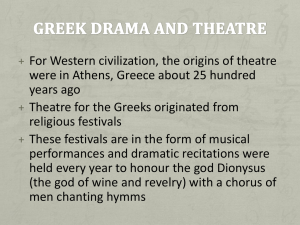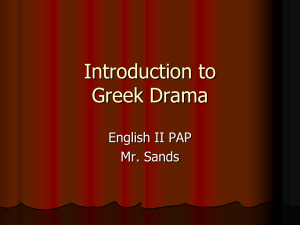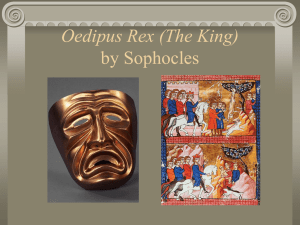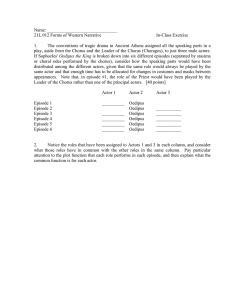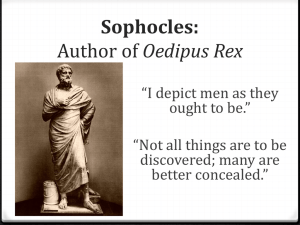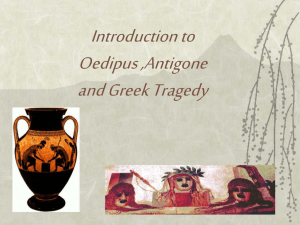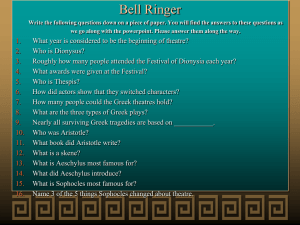Greek Drama - Plain Local Schools
advertisement
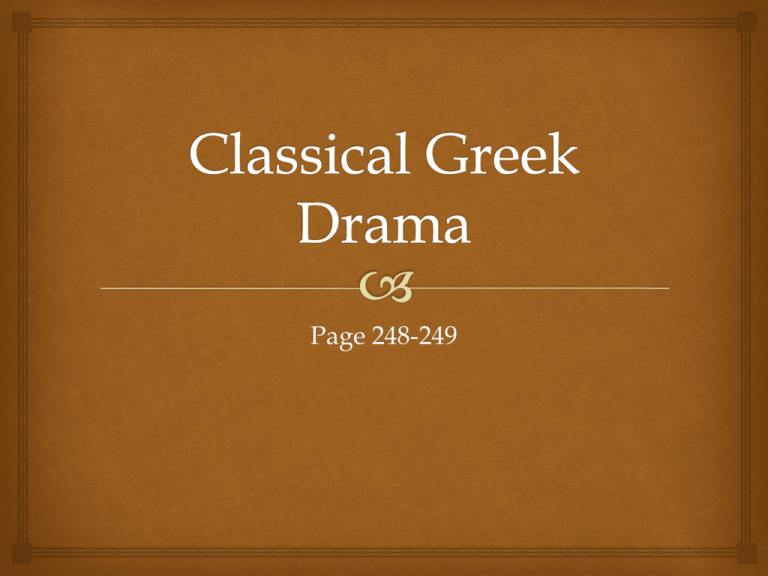
Page 248-249 Greek Theatre Reasons for the theatre: Entertainment Show religion Advance and show loyalty to politics Honor local heroes Major social event Competition Discussion of philosophical issues Origins of Greek Drama One of the oldest forms of theatre Came from religion and myths Gained popularity in 6th century BC Performance Origins: Dionysus: God of wine; people danced and sang to Dionysus at festivals Thespis: Lyric Poet; introduced us to a single actor *Today actors are called thespians! Aeschylus: Added a second actor Sophocles: Adding a third Greek Theatre Vocabulary Chorus: A group of actors that voiced attitudes of the community Thespians: Actors Drama: Greek word for “doing” In what ways are Greek dramas different from Homer’s epics? At the Theater Athens 15,000 people The actors had to exaggerate their movements or they couldn’t be seen by the whole audience Only men performed Masks were worn Made of Linen Wood Wool Plaster At the Theater Actors wore robes which seemed to evolve into costumes Chorus members dressed in the roles they were playing Examples: soldiers, priests, animals, etc. Open-air: Used natural light and heat Few props Only used as symbols to identify roles Example: A soldier would carry a sword and shield At the Theater A messenger would usually deliver bad news in detail For Example: Violence occurred off stage Murder Suicide Battles Greek Festival Festival of Dionysus In Athens Drama competition Four greatest Greek dramatists Aeschylus Sophocles Euripides Aristophanes Topics of Plays Comedies Made fun of society, politics, gods Tragedies Fall of a great man or woman The Tragic hero is neither very good or very bad The hero’s downfall is brought on my a flaw within their character The tragic flaw encourages people to look at their own lives to define their beliefs Familiar Themes Myths History Politicians Humankind’s struggle to find meaning and self-understanding Sophocles: Page 250 5th century BC during the Golden Age of Greece Political and cultural achievement Born into a wealthy family Handsome Athletic Skilled in music Studied tragedy, music composition, and choreography Sophocles: Writing Wrote 120 plays 24 won first prize at the festival Only 7 survived intact Oedipus the King is the one of the best! Innovation: Introduced a third actor to the stage Invented scenery Invented special effects Example: Lowing an actor from the sky Oedipus Preview Is it always better to know the truth? Would you rather have someone lie to you if it will save your feelings? Give examples. Oedipus Preview According to Legend . . . Oedipus arrived at Thebes A sphinx (wings, lion’s body, woman’s head) was killing people In order to save them, someone had to answer this riddle: What walks on four legs in the morning, two at noon, and three in the evening? Your Answer ____________________________________ Oedipus Preview Oedipus answered correctly: Man Man crawls as a baby, walks on two legs as a man, and uses a stick in old age When the sphinx heard this, she killed herself Oedipus became king Oedipus married the widowed queen Jocasta Vocabulary Chorus: Danced and chanted between scenes, commented on action; express social and religious views Dignity: The quality of being worthy of honor Vengeance: Revenge; The return of a harmful deed for a harmful deed Denounce: To inform against, accuse publicly Dire: Terrible; bad enough to arouse dread Lit Terms Denotation: Dictionary meaning Connotation: Emotional meaning it evokes

